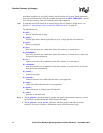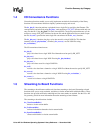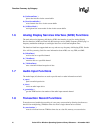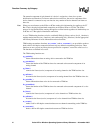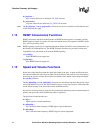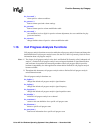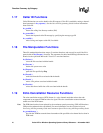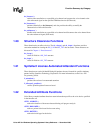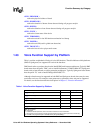
26 Voice API for Windows Operating Systems Library Reference — November 2003
Function Summary by Category
1.17 Caller ID Functions
Caller ID functions are used to handle caller ID requests. Caller ID is enabled by setting a channel-
based parameter in dx_setparm( ). See the Voice API Programming Guide for more information
about caller ID.
dx_gtcallid( )
returns the calling line directory number (DN)
dx_gtextcallid( )
returns the requested caller ID message by specifying the message type ID
dx_wtcallid( )
waits for rings and reports caller ID, if available
1.18 File Manipulation Functions
These file manipulation functions map to C run-time functions, and can only be used if the file is
opened with the dx_fileopen( ) function. The arguments for these Intel® Dialogic® functions are
identical to the equivalent Microsoft* Visual C++ run-time functions.
dx_fileclose( )
closes the file associated with the handle
dx_fileerrno( )
obtains the system error value
dx_fileopen( )
opens the file specified by filep
dx_fileread( )
reads data from the file associated with the handle
dx_fileseek( )
moves a file pointer associated with the handle
dx_filewrite( )
writes data from a buffer into a file associated with the handle
1.19 Echo Cancellation Resource Functions
The echo cancellation resource (ECR) feature is a voice channel mode that reduces the echo
component in an external TDM bus time slot signal. The echo cancellation resource functions
enable use of the ECR feature.
Note: The ECR functions have been replaced by the continuous speech processing (CSP) API functions.
CSP provides enhanced echo cancellation. For more information, see the Continuous Speech
Processing API Programming Guide and Continuous Speech Processing API Programming Guide.
dx_getxmitslotecr( )
provides the TDM bus transmit time-slot number of the specified voice channel device when in
ECR mode



